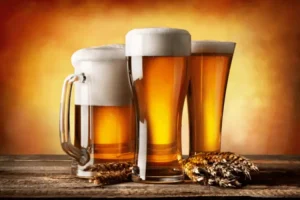
Although the innate immune response is immediate, it is not specific to any given pathogen. Some of the most notable contributors to the innate immune response include natural killer (NK) cells, neutrophils, monocytes, macrophages, and dendritic cells (DCs). For example, a 2015 study in the journal Alcohol found that binge drinking can reduce infection-fighting white blood cells known as monocytes in the hours after peak intoxication, essentially weakening your immune system. Though there’s still limited data on the link between alcohol and COVID-19, past evidence shows alcohol consumption can worsen the outcomes from other respiratory illnesses by damaging the lungs and gut, and impairing the cells responsible for immune function. Immune infiltration analysis was conducted using the “immuneeconv” R package, integrating several advanced algorithms including quanTIseq, CIBERSORT, MCP-counter, EPIC, and ssGSEA.

Alcohol distracts the body from other functions
T and B cell activation in the presence of retinoic acid results in the up-regulation of gut-homing molecules and generation of IgA-secreting B cells (Mora, Iwata et al. 2008). Consequently, deficiency in vitamin A results in the impairment of mucosal responses (Mora, Iwata et al. 2008). Vitamin D has long been known to have a critical role in calcium and phosphorous homeostasis. In addition, antigen presenting cells convert vitamin D to 1,25(OH)2VD3, a physiologically active form of vitamin D that is highly concentrated in lymphoid tissues (Mora, Iwata et al. 2008) where it can modulate function of T and B cells which express vitamin D receptors. Vitamin D deficiency results in reduced differentiation, phagocytosis and oxidative burst, by monocytes as well as defective bactericidal activity by keratinocytes (Fabri, Stenger et al. 2011, Djukic, Onken et al. 2014). The white blood cells, tissues and organs that make up our body’s immune system are designed to fight off infections, disease and toxins.
ZNF26-Associated Genes as Prognostic Signatures in Colorectal Cancer with Broad Therapeutic Implications
Alcohol metabolism can also take place in the pancreas by acinar and pancreatic stellate cells, which contributes to the development of alcoholic pancreatitis (Vonlaufen, Wilson et al. 2007). Additional studies are required to fully understand the role of ethanol metabolites and adducts in the development of alcoholic liver injury and organ damage. Past research shows alcohol consumption leads to more severe lung diseases, like adult respiratory distress syndrome (ARDS) and other pulmonary diseases, including pneumonia, tuberculosis, and respiratory syncytial virus.
- They produce immune molecules called antibodies or immunoglobulins that they can either display on their surface or secrete.
- The proportional hazards assumption was tested using Schoenfeld residuals, and stratified analyses were conducted when this assumption was violated.
- Inhibiting BEAN1 may help disrupt the immunosuppressive TME, enhance the efficacy of immune checkpoint inhibitors, and overcome chemotherapy resistance.
- Consequently, deficiency in vitamin A results in the impairment of mucosal responses (Mora, Iwata et al. 2008).
- These may include infections after surgery, traumatic injury, or burns; accelerated progression of HIV disease; adult respiratory distress syndrome and other opportunistic lung infections; and infection with hepatitis C virus, cirrhosis, or liver cancer (hepatocellular carcinoma).
1 Expression and prognostic significance of BEAN1 in pan-cancer
Functional enrichment, immune infiltration, and treatment response analyses were conducted, followed by validation using patient tissue samples. It has been established that peripheral lymphopenia and T-cell unresponsiveness are prolonged in stroke patients– factors that make these patients susceptible to infections. In the early days of my illness, it seemed about every person I’ve ever made eye contact with had some secret diet that cured their mother’s cousin’s best friend’s favorite blogger’s daughter’s autoimmune disease.

- Nonhuman primates, on the other hand, voluntarily consume different amounts of alcohol and allow us to conduct studies in an outbred species that shares significant physiological and genetic homology with humans while maintaining rigorous control over diet and other environmental cues.
- The induced innate humoral response plays a critical role in clearing or containing infection while an adaptive response develops.
Ethanol is primarily metabolized in the stomach and liver by alcohol dehydrogenase (ADH) and cytochrome P450 2E1 (CYP2E1) (Zakhari 2006). ADH is present in the cytosol whereas CYP2E1 is present predominantly in microsomes. Both enzymes convert alcohol to acetaldehyde, which is further metabolized to acetate https://ecosoberhouse.com/ by acetaldehyde dehydrogenase (ALDH) in the mitochondria. Acetate is then released into the blood where it is oxidized to carbon dioxide in the heart, skeletal muscle, and brain (Zakhari 2006). Those who have any of the known risk factors for COVID-19, like heart disease or diabetes, should drink even less.
Molecular Mechanisms of Dose Dependent Modulation of Immunity
However, polyphenol-rich dry red wine and clear liquors mixed with soda waters or lower sugar swaps, like some green juices, are your friends. If you’re like me and not yet ready to commit to sobriety, here are some tips for drinking with an autoimmune disease. “Immune does alcohol weaken your immune system system recovery depends on how long you have been drinking, how much and how much damage you have done to your liver. Although your immune system may recover over time, at some point, liver damage becomes irreversible and your immune system will not recover.”
The ESTIMATE algorithm was used to compare immune, stromal, and ESTIMATE scores between high and low BEAN1 expression groups in READ. The expression of ICGs (CD274, HAVCR2, PDCD1LG2, SIGLEC15) was compared between the two groups. Stemness and drug sensitivity scores were assessed to evaluate the response of BEAN1 to chemotherapy, including the calculation of mRNAsi scores and 5-FU half-maximal inhibitory concentration (IC50) scores.

Can You Drink Alcohol With Antidepressants Like Cymbalta or Amitriptyline?
Even if you blew it out the night before and are left with only empty cans, a bag of Cheetos, and a compromising Polaroid as evidence of what happened, don’t beat yourself up. Having an autoimmune disease may also increase your risk of developing autoimmune hepatitis. If you frequently test the limits of your liver, taking a liver support supplement can never be a bad idea. Where a night of drinking for most people would typically result in a headache and an unhinged Instagram story, those with autoimmune diseases are often left with some additional gifts. Though heavy alcohol use has long-term impacts on your immune system and overall health, it is never too late to seek treatment. A weakened immune system makes it more difficult for your body to fight off infection.
